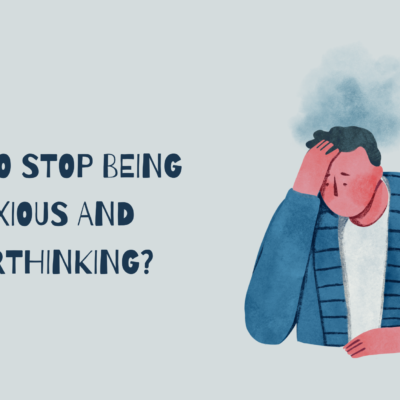How to Stop Being Anxious and Overthinking: Anxiety and overthinking often feel like an endless cycle of worry and self-doubt. They can sap your energy, impact your decision-making, and affect your overall quality of life. The good news is that with the right tools and mindset, you can break free from these patterns. In this guide, we’ll explore actionable strategies to help you stop being anxious and overthinking.
Also Read:
- 10 Life-Changing Steps That Will Help You Forgive And Let Go of The Past! (steps on how to forgive)
- Crying for No Reason: Causes and Treatment.
- 7 ways the universe tests you, right before a major breakthrough.
Understanding Anxiety and Overthinking
Before tackling anxiety and overthinking, it’s essential to understand what they are and why they occur.
- Anxiety: A natural response to stress, anxiety often manifests as fear or apprehension about the future. While it can be helpful in certain situations, chronic anxiety can interfere with daily life.
- Overthinking: This is when you excessively analyze or dwell on situations, often imagining worst-case scenarios. Overthinking can stem from anxiety, perfectionism, or fear of failure.
Recognizing these patterns is the first step toward overcoming them.
How to Stop Being Anxious and Overthinking?
1. Identify Triggers
Understanding what triggers your anxiety or overthinking is crucial for managing them effectively.
- Keep a journal: Write down moments when you feel anxious or start overthinking. Identify common themes or situations.
- Reflect on patterns: Notice if specific events, people, or environments tend to trigger your anxiety.
- Address the root cause: Once you recognize your triggers, you can work on minimizing their impact.
2. Challenge Negative Thoughts
Anxiety and overthinking often thrive on distorted or negative thinking. Learning to challenge these thoughts can help you gain clarity.
- Ask yourself questions: Is this thought based on facts or assumptions? What’s the worst that can happen, and how likely is it?
- Reframe the narrative: Replace negative thoughts with more positive or realistic alternatives.
- Use affirmations: Practice self-affirming statements like, “I am capable of handling challenges,” to counteract self-doubt.
3. Practice Mindfulness
Mindfulness helps you stay present and reduces the tendency to dwell on past mistakes or future worries.
- Meditation: Spend 5–10 minutes a day focusing on your breath or observing your thoughts without judgment.
- Grounding techniques: Use your senses to connect with the present moment. For example, notice five things you see, four you can touch, three you hear, two you smell, and one you taste.
- Be fully engaged: Focus on the task at hand instead of multitasking or worrying about what’s next.
4. Focus on What You Can Control
Anxiety often arises from worrying about things beyond your control. Shift your focus to what you can influence.
- List actionable steps: Break down your concerns into manageable tasks.
- Let go of the uncontrollable: Accept that some things are outside your influence and focus on what you can change.
- Practice acceptance: Remind yourself that uncertainty is a natural part of life.
5. Set Boundaries with Your Thoughts
Just because a thought enters your mind doesn’t mean it deserves your attention.
- Schedule “worry time”: Set aside 10–15 minutes a day to acknowledge your concerns. Outside of this time, gently redirect your focus.
- Use thought-stopping techniques: When you catch yourself overthinking, say “Stop” out loud or visualize a stop sign.
- Redirect your energy: Engage in an activity that demands your full attention, such as exercising, cooking, or drawing.
6. Practice Self-Care
Taking care of your physical and emotional well-being can significantly reduce anxiety and overthinking.
- Prioritize sleep: Aim for 7–9 hours of quality sleep each night.
- Eat a balanced diet: Avoid excessive caffeine and sugar, which can exacerbate anxiety.
- Exercise regularly: Physical activity releases endorphins, which are natural mood boosters.
7. Develop Healthy Coping Mechanisms
Building resilience through healthy coping strategies can help you navigate anxiety more effectively.
- Deep breathing exercises: Practice diaphragmatic breathing to calm your nervous system. Inhale for four counts, hold for four, and exhale for six.
- Progressive muscle relaxation: Tense and relax each muscle group in your body to release physical tension.
- Journaling: Write down your worries to gain perspective and release pent-up emotions.
8. Limit Overexposure to Stressors
Sometimes, reducing your exposure to stress-inducing factors can help alleviate anxiety.
- Cut down on news consumption: Stay informed, but avoid overloading yourself with negative news.
- Manage social media use: Limit time on platforms that trigger comparison or negative emotions.
- Say no: Avoid overcommitting and prioritize your mental health.
9. Seek Support
Talking to someone can provide relief and offer a new perspective.
- Share with a trusted friend or family member: Opening up about your feelings can lighten your mental load.
- Join a support group: Connecting with others who face similar challenges can help you feel less alone.
- Consult a professional: Therapists or counselors can provide tailored strategies to manage anxiety and overthinking.
10. Practice Gratitude
Focusing on the positive aspects of your life can help shift your mindset and reduce overthinking.
- Start a gratitude journal: Write down three things you’re grateful for each day.
- Express gratitude: Share your appreciation with others, whether through a note or a heartfelt conversation.
- Focus on achievements: Reflect on what you’ve accomplished rather than dwelling on what you haven’t.
11. Take Breaks
Stepping back from overwhelming situations can help clear your mind.
- Practice the 20-20-20 rule: Every 20 minutes, look at something 20 feet away for 20 seconds to reduce mental strain.
- Go for a walk: Spending time in nature can reduce stress and improve focus.
- Engage in hobbies: Rediscover activities you enjoy to recharge and redirect your energy.
12. Be Patient with Yourself
Overcoming anxiety and overthinking is a journey, not a destination. Be kind to yourself along the way.
- Celebrate small wins: Acknowledge progress, even if it feels minor.
- Avoid perfectionism: Accept that it’s okay to make mistakes and have setbacks.
- Practice self-compassion: Treat yourself with the same kindness you’d offer a friend.
Final Thoughts
Stopping anxiety and overthinking isn’t about eliminating worry altogether—it’s about learning to manage it effectively. By incorporating these strategies into your daily life, you can create a more balanced and peaceful mindset. Remember, it’s okay to seek help and take things one step at a time. With patience, persistence, and self-care, you can reclaim control over your thoughts and lead a more fulfilling life.








